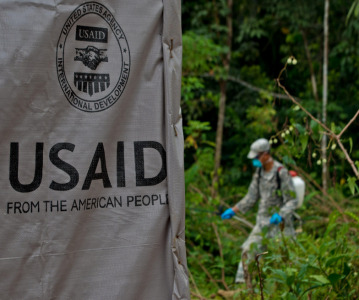Western countries consider stockpiles, place orders for vaccine against monkeypox

The US, Canada, UK, France, Germany, and Spain are among several countries to purchase vaccine doses.
Several countries in Europe and North America have started offering vaccines for monkeypox to their most exposed citizens, as cases of the viral disease continue to rise.
There is currently no specific vaccine for monkeypox, but data shows that vaccines used to eradicate smallpox are up to 85% effective against it, according to the World Health Organisation. The vaccine is made by Danish biotech Bavarian Nordic and goes under the name Imvanex in the European Union, Imvamune in Canada, and Jynneos in the US.
Last week, the EU agreed on common purchasing of the vaccine and the UK struck a deal for 20,000 doses. Canada said it had started pre-positioning the Imvamune vaccine from its national emergency stockpile across the country, while the US said it was in the process of releasing the Jynneos vaccine. US officials said there were more than 1,000 doses of the vaccine in the national stockpile and they expected that level to ramp up quickly in the coming weeks.
Several countries are also striking deals to purchase the antiviral tecovirimat, developed by US-based SIGA Technologies. Tecovirimat, sold under the brand name TPOXX among others, is an oral medication which is approved in Europe as a treatment against orthopoxviruses such as smallpox and monkeypox.
Global health officials have tracked more than 300 suspected and confirmed cases of the viral infection in about 20 countries since early May. Monkeypox is a usually mild viral infection that is endemic in parts of west and central Africa.
Symptoms of the disease - which can include fever, distinctive rashes and pus-filled skin lesions - can last for two to four weeks, but often resolve on their own. The variant of the virus implicated in the current outbreak is believed to kill a small fraction of those infected.
Last week, a senior World Health Organisation official advised that countries take steps to contain the spread of the disease and share data about their vaccine stockpiles.
‘We think that if we put in place the right measures now, we probably can contain this easily,’ Sylvie Briand, WHO director for Global Infectious Hazard Preparedness, told the UN agency's annual assembly.
She said: ‘We don't know exactly the number of doses available in the world and so that’s why we encourage countries to come to WHO and tell us what are their stockpiles.’
While the size of global supply is unclear, it is estimated to be quite constrained. WHO officials are advising against mass vaccination, instead suggesting targeted administration where available for close contacts of people infected.
Related News
-
News US FDA adds haemodialysis bloodlines to devices shortage list
On March 14, 2025, the US FDA published an open letter to healthcare providers citing continuing supply disruptions of haemodialysis bloodlines, an essential component of dialysis machines. -
News Women in Pharma: Manufacturing personal and team success
Our monthly Women in Pharma series highlights the influential lives and works of impactful women working across the pharmaceutical industry, and how the industry can work towards making the healthcare industry and workplace more equitable and inclusive... -
News Pfizer may shift production back to US under Trump pharma tariffs
At the 45th TD Cowen annual healthcare conference in Boston, USA, Pfizer CEO Albert Bourla outlined the potential for Pfizer to shift its overseas drug manufacturing back to the US as pharmaceutical industry players weigh their options against Presiden... -
News Experimental drug for managing aortic valve stenosis shows promise
The new small molecule drug ataciguat is garnering attention for its potential to manage aortic valve stenosis, which may prevent the need for surgery and significantly improve patient experience. -
News Women in Pharma: Connecting accessible pharma packaging to patients – a Pharmapack Special
Throughout our Women in Pharma series, we aim to highlight how CPHI events encourage discussions around diversity, equity, and inclusion initiatives in the pharmaceutical industry. -
News Vertex Pharmaceuticals stock jumps as FDA approves non-opioid painkiller
UK-based Vertex Pharmaceuticals saw their stock shares soar as the US FDA signed off on the non-opioid painkiller Journavx, also known as suzetrigine, for patients with moderate to severe acute pain, caused by surgery, accidents, or injuries. -
News Trump administration halts global supply of HIV, malaria, tuberculosis drugs
In various memos circulated to the United States Agency for International Development (USAID), the Trump administration has demanded contractors and partners to immediately stop work in supplying lifesaving drugs for HIV, malaria, and tuberculosis to c... -
News 2024 Drug Approvals: a lexicon of notable drugs and clinical trials
50 drugs received FDA approval in 2024. The centre for biologics evaluation and research also identified six new Orphan drug approvals as under Biologics License Applications (BLAs). The following list picks out key approvals from the list, and highlig...
Recently Visited
Position your company at the heart of the global Pharma industry with a CPHI Online membership
-
Your products and solutions visible to thousands of visitors within the largest Pharma marketplace
-
Generate high-quality, engaged leads for your business, all year round
-
Promote your business as the industry’s thought-leader by hosting your reports, brochures and videos within your profile
-
Your company’s profile boosted at all participating CPHI events
-
An easy-to-use platform with a detailed dashboard showing your leads and performance







